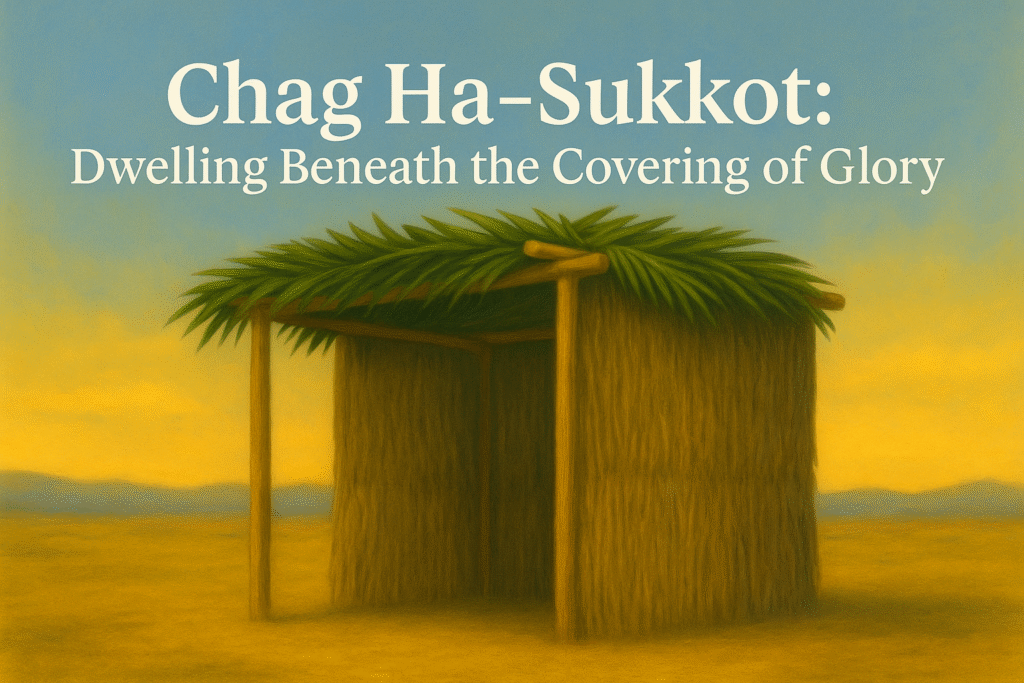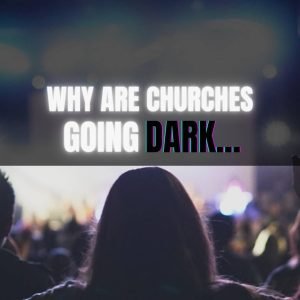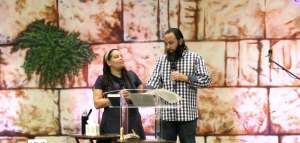

When the Scroll Was Read — A Nation Restored
In the days of Ezra and Nehemiah, when the Torah of Moshe was read aloud in Jerusalem, something extraordinary occurred — a national deliverance rooted in repentance.
“Do not mourn or weep… go your way, eat the fat, drink the sweet, and send portions to those for whom nothing is prepared; for this day is holy to Yehovah… for the joy of Yehovah is your strength.”
— Nehemiah 8 : 9–10 (TLV)
As the people listened, they rediscovered the command in the Torah to celebrate Chag Ha-Sukkot — the Feast of Booths (Tabernacles). Immediately, they obeyed:
“Go out to the mountain and bring olive branches, oil-tree branches, myrtle branches, palm branches, and branches of thick trees to make booths, as it is written.”
— Nehemiah 8 : 15
They built their sukkot from these branches and lived beneath them for seven days while Ezra read from the Torah daily (Nehemiah 8 : 18).
“And there was very great joy.” — Nehemiah 8 : 17
This was more than obedience — it was deliverance through restoration.
When the people realigned with the written Word, they broke free from generations of bondage and re-entered Yehovah’s covenant covering.
The Feast Commanded — A Pattern of Deliverance
“On the fifteenth day of this seventh month shall be the Feast of Booths for seven days to Yehovah… You shall take the fruit of splendid trees, branches of palm trees, boughs of leafy trees, and willows of the brook; and you shall rejoice before Yehovah your Elohim seven days.”
— Leviticus 23 : 34 – 40
Sukkot is both a celebration and a strategy — a feast that teaches how to war through obedience and how to dwell in deliverance.
When Israel built booths in the wilderness, they learned dependence on Yehovah. When we build ours, we declare again:
“Yehovah is my shelter; I dwell beneath His covering.”
The Four Species — Materials of Obedience and Faith
The “four species” listed in Leviticus 23 and echoed in Nehemiah 8 reveal categories of life and warfare:
| Category of Vegetation | Symbolic Meaning in the Spirit | Scriptural References |
|---|---|---|
| Leafy trees that give shade | The overshadowing Presence of Yehovah | Ezek 20 : 28 / Isa 4 : 5 |
| Date palms | Uprightness and fruitfulness of the righteous | Ps 92 : 12 |
| Fruit trees | Obedience that produces lasting fruit | Lev 23 / John 15 : 5 |
| Willows or trees by water | Rootedness in the Word and Spirit | Isa 44 : 4 / Ps 1 : 3 |
The word Sukkah (סֻכָּה) comes from S-Kh-Kh — “to cover, to hedge, to enclose.”
Its central purpose is not walls but the covering itself — the schach, the branches through which light filters.
It reminds us that protection comes from Yehovah alone.
“For in the day of trouble He will conceal me in His sukkah.” (Psalm 27 : 5)
“Upon all the glory shall be a covering.” (Isaiah 4 : 5)
Deliverance Through Dwelling — The Weapon of Rest
During Israel’s journey through the wilderness, the Presence of Yehovah rested upon the Tabernacle in the form of a pillar of cloud by day and fire by night (Exodus 40:34–38; Numbers 9:15–23). When the cloud lifted, the people set out. When it remained, they stayed where they were. This was not aimless wandering — it was discipled movement under divine command.
That rhythm reveals a key principle of deliverance: victory comes through obedience and alignment, not striving.
Israel’s safety did not depend on strength, weapons, or walls, but on remaining beneath the visible manifestation of Yehovah’s glory.
To dwell under the sukkah is to return to that same posture — dependence on Yehovah, obedience to His commands, and trusting Him in every circumstance.
The sukkah reminds us that deliverance is not escape from hardship; it is abiding under Yehovah’s order and protection.
True rest is not idleness, but a weapon; it is the stillness of one whose heart is anchored in confidence that Yehovah reigns.
The Joy of Sukkot — Strength in Rejoicing
You shall rejoice in your feast… seven days you shall keep a feast to Yehovah your Elohim in the place which Yehovah will choose, because Yehovah your Elohim will bless you in all your produce and in all the work of your hands, and you shall surely rejoice.”
— Deuteronomy 16 : 14–15“Do not be grieved, for the joy of Yehovah is your strength.”
— Nehemiah 8 : 10
From the beginning, Yehovah commanded that Sukkot be kept with rejoicing — not as a suggestion but as an act of obedience.
When Israel rediscovered the Torah in the days of Nehemiah and restored the feast, their first reaction was tears of conviction — yet they were told to rejoice.
That instruction was not denial; it was spiritual direction. Righteous grief acknowledges brokenness, but joy establishes restoration. In the realm of spiritual warfare, joy is not a feeling — it is a weapon – evidence that the enemy’s grip has been broken. Where there is joy in Yehovah, there can be no agreement with fear or despair.
“With joy you will draw water from the wells of salvation.”
— Isaiah 12 : 3
This verse was proclaimed during Sukkot as the priests poured water on the altar in the water-drawing ceremony (Simchat Beit HaShoeva). It was a prophetic picture of the outpouring of the Ruach Ha’Kodesh, living water flowing from Yehovah into the hearts of His people.
Yeshua later revealed the fulfillment of this moment when He cried out in the Temple:
“If anyone thirsts, let him come to Me and drink. He who believes in Me, as the Scripture has said, out of his innermost being will flow rivers of living water.”
— John 7 : 37–38
Thus, the joy of Sukkot becomes not only celebration but spiritual renewal — the joy that comes from being filled with the Ruach Ha’Kodesh and abiding in the presence of Elohim.
The Sukkah as the Secret Place of Protection
The sukkah is more than a temporary shelter — it is a visible declaration of trust.
As Israel journeyed through the wilderness, Yehovah’s Presence covered them by day in a pillar of cloud and by night in a pillar of fire (Exodus 13:21–22; Numbers 9:15–23).
That same covering symbolizes His protection over every generation that obeys His voice.
“You shall dwell in booths seven days… that your generations may know that I made the children of Israel dwell in booths when I brought them out of the land of Egypt.”
— Leviticus 23:42-43
Every household that dwells in a sukkah enters into this pattern of trust that Israel learned in the wilderness — resting beneath Yehovah’s covering and remembering His faithfulness from generation to generation.
To dwell in the sukkah is to acknowledge His protection and abide in His shalom.
“For in the day of trouble He will conceal me in His sukkah; in the secret place of His tent He will hide me.”
— Psalm 27:5
Those who abide beneath His covering experience the shalom promised to those who take refuge in Him:
“He who dwells in the secret place of Elyon shall abide under the shadow of Shaddai.”
— Psalm 91:1
Thus, the sukkah becomes not only a remembrance of deliverance past but a living testimony that Yehovah still shelters His people today — teaching every generation to dwell in faith, walk in obedience, and rest under the shadow of His Presence.
Prophetic Fulfillment — The Final Deliverance
“And it shall come to pass that everyone who survives of all the nations which came against Jerusalem shall go up year by year to worship the King, Yehovah Tzeva’ot, and to keep the Feast of Booths.” (Zechariah 14 : 16)
Sukkot foreshadows the Millennial Reign of Messiah Yeshua — the ultimate season of shalom and restoration when the nations will learn to dwell under Yehovah’s covering.
“Behold, the dwelling place of Elohim is with men, and He will dwell with them.” (Revelation 21 : 3)
This is the final deliverance — the day when the temporary sukkah gives way to the eternal dwelling of glory.
Ephraim and Judah — Restored Under One Covering
“I will make them one nation in the land upon the mountains of Israel… and they shall no longer be two nations, nor divided into two kingdoms again.” (Ezekiel 37 : 22)
As Ephraim returns to the Torah and Judah acknowledges Messiah, the ancient breach is closing.
Sukkot is the appointed time that rehearses this unity — one people, one King, one dwelling.
Each sukkah is a prophetic sign that the House of Israel is being restored under the covering of Yehovah’s glory.
Conclusion
Sukkot is not just a festival of remembrance — it is a divine blueprint for deliverance:
- To leave Egypt is to forsake bondage
- To rejoice in His goodness is to strengthen the spirit for battle
- To dwell in His Presence is to live in victory
- To rest beneath His covering is to abide in shalom
Every branch laid upon the sukkah, every moment spent beneath its shade, is a confession that our Deliverer still tabernacles among us.
“Chag Ha-Sukkot Sameach — May your dwelling be filled with shalom, your heart with joy, and your home with the glory of His Presence.”













